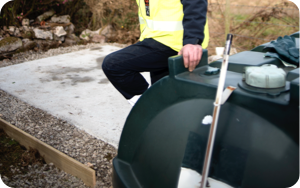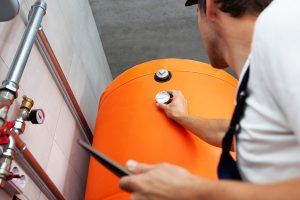Signs it’s Time for a Heating Oil Tank Replacement
You may be wondering whether you are due for a central heating oil tank replacement, but what are the signs? We’ll let you know what to look out for so you can continue to heat your home with confidence!
How long do heating oil tanks last?
A quality domestic oil tank should typically last between 20-25 years. However, the longevity depends on whether your oil tank installation and servicing is carried out by a qualified professional.
There are also a few key factors that may have an impact on how long your oil tank will last, including:
- Tank location
- Exposure to the elements
- Corrosion resistance
- Frequency of servicing
It is also worth bearing in mind that steel oil tanks and bunded oil tanks will generally last longer than plastic oil tanks. But, you can increase the lifespan of your plastic tank by reinforcing it with corrosion-resistant polyethylene.
Read our guide to the different types of heating oil tanks to see which one is best for you and your home.
Do you need a new heating oil tank or can you repair it?
When deciding whether to replace your oil tank or carry out repairs you need to consider the extent of the wear and tear on your boiler. Repairing small holes and replacing fittings can offer a few extra years of operation.
However, replacing your oil tank may be the only option if the level of damage is too high. A new oil tank may cost more upfront, but it will provide reliability and peace of mind.
When deciding which route to go down, it’s important to weigh up the extent of the damage, any environmental factors and potential risks. If you are unsure, make sure to seek professional advice to reduce the risk of any unexpected problems.
Do you need a new oil tank when replacing the boiler?
When replacing your oil boiler, you don’t legally have to change your oil storage tank at the same time. However, you should check whether installing the new boiler makes your oil tank non-compliant.
If an incident occurs and your oil storage tank doesn’t comply with current legislation, you could encounter problems if you try to make an insurance claim.
For more information take a look at our helpful blog to determine if it’s time for an oil boiler upgrade.
What are the signs that your oil storage tank needs replacing?
There are a few signs to look out for when trying to determine if your oil tank needs replacing, including:
1. Your heating systems aren’t performing as they should
A good indicator of whether your oil tank needs replacing is whether or not it is working efficiently. Another factor to look out for is whether your costs are increasing.
While these rules may vary from system to system, generally these issues can mean that there is pollution in your system or that it is leaking.
2.The oil tank has signs of corrosion and rust
One of the clearest signs that your oil tank needs replacing is visible rust and corrosion on the exterior of your metal oil tank.
You can expect a few signs of wear and tear as the years go by, but extensive flaking, pitting and rust suggest serious deterioration. Left untreated, you risk developing cracks, leaks or even tank failure.
3.There is an oil leak or signs of contamination
You should always act immediately if you suspect leaking oil. If there is visible oil sheen on your tank or nearby surfaces it can be the result of an escalating problem.
Leaks that are left to continue can pose a serious environmental risk. Plus, they often result in significant cleanup costs as well as potential damage to the tank enclosure. Depending on how severe the leak is, it may be possible to repair your tank but it could be more efficient to replace it.
4.Your domestic oil tank has an outdated single skin design
Your single-skinned oil tanks can still work to a high standard, but are more likely to need replacing sooner than double-skinned tanks. The need for early replacement is largely because of their single layer of protection.
Single-skinned oil tanks are still legal, but don’t have the same level of leak and contamination detection as newer models. Upgrading to a stronger double-skinned tank is often recommended, but can depend on the state of the tank under inspection.
Learn how to fix common heating oil tank issues in our expert guide.
How much to replace a heating oil tank?
To learn more about the cost of replacing your heating oil tank, contact our expert team for a free quote.
Avoid unnecessary risks by replacing your home heating oil tank – our professional service will set your mind at ease. We will refer you to a local OFTEC registered engineer to take care of delivery and installation from start to finish.





